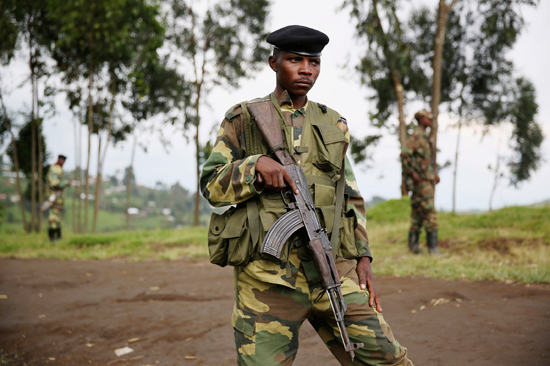Cardinal Vincent Nichols and the Archbishop of Canterbury have praised a grassroots peace initiative run by church leaders from the Democratic Republic of Congo.
Delegates from the Peace in the Great Lakes initiative, including Catholic and Anglican leaders from DRC, Burundi and Rwanda, met Archbishop Justin Welby and Cardinal Nichols at Lambeth Palace last Thursday to discuss how Churches could help foster peace in the region, which for decades has suffered political instability and armed conflicts, porous borders and humanitarian crises, along with tensions over natural resources.
The ecumenical initiative, set up in December, works with victims of the conflict, including women and girls who have suffered sexual violence.
The African prelates said that disarming rebel forces was essential and called on both Churches to help bring about reconciliation.
They emphasised the need to foster a climate of confidence and cooperation in the region, stressing the importance of governments respecting the international accords and conventions they had signed.
The delegation included, from Rwanda, the Anglican Bishop of Kigeme, Augustin Mvunabandi and the Catholic Bishop of Kibungo, Kambanda Antoine; and from DRC, the Catholic Bishop of of Bokungu–Ikela, Fridolin Besungu Ambongo.
Archbishop Welby said: “This initiative is inspirational in bringing together different denominations and in working together across the region of the Great Lakes to build peace,” he said.

Meanwhile the charity Christian Aid warned this week that the largest armed group in the DRC, the Democratic Forces for the Liberation of Rwanda (FDLR), had stepped up the violence and frequency of attacks on civilians in rebel strongholds in Kanyabayonga, Lubero Territory in North Kivu, near the Rwandan border.
The attacks follow the launch of a UN-backed £100m disarmament strategy that aimed to eradicate 54 militias in the DRC by 2019.
A spokesman for Christian Aid said that the FDLR was resisting the UN and national army’s efforts to bring about peace. “The rebels are not ready to accept any kind of integration into the Congolese army, and they want to demonstrate that they are still active and can cause absolute mayhem for local people if their requests are not taken seriously,” said Bila Inogwabini, Christian Aid’s country manager for DRC. Mr Inogwabini said the rebels are demanding dialogue and negotiation with the Rwandan Government.
Above: Rebel fighter stands guard during withdrawal in DRC. Photo: CNS/Goran Tomasevic, Reuters


 Loading ...
Loading ...